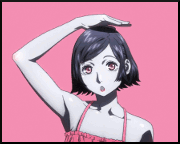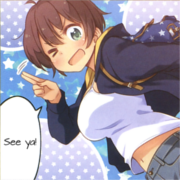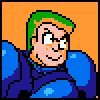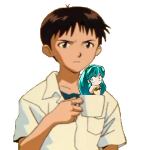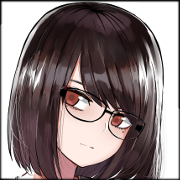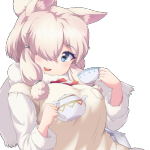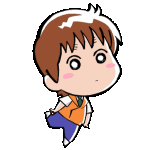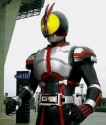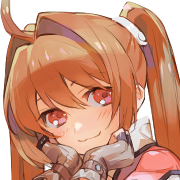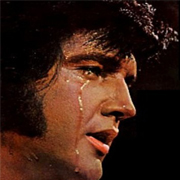a kitten posted:Are you an episode behind or something? 10 is the most recent on my CR app 
|
|
|
|
|

|
| # ? Jun 3, 2024 14:40 |
|
dogsicle posted:10 is the most recent on my CR app What you wanted to happen happened at the end of 10, maybe i just misunderstood you.
|
|
|
|
Davincie posted:i would die so fast if i lived in the gatchaman universe lol Normie-protected genocide of undesirables...a scary proposition
|
|
|
a kitten posted:What you wanted to happen happened at the end of 10, maybe i just misunderstood you. oh, I'm just watching it now, but the OP reminded me that Gel used to be cute
|
|
|
|
|
I'm glad Gel has gone back to being cute, and also now has learned to think about himself, and decided he wants to hang out with Tsubasa again.
|
|
|
|
Cao Ni Ma posted:Pink haired still wanted him but she was under duress of imminent vore if she didn't comply. The other girls are horrible and should probably I felt bad for her
|
|
|
|
I hope Sugane gets together with pink-haired girl at the end.
|
|
|
|
NowonSA posted:I don't think I'm prepared for the level of innuendo that Hajime scissoring her enemies while riding Tsubasa would entail. Hello
|
|
|
|
the mean Kuus are awesome, i want one e: is Hajime using new scissors?
|
|
|
|
|
Sorry I was behind , but I caught up today. I like this show a lot
|
|
|
|
Davincie posted:millione is a bad guy. he's a huge part of the problem as a guy who helps create the atmosphere Considering he represents mass media, it makes perfect sense.
|
|
|
|
Milli-oh-ne-liiive
|
|
|
|
That was a good episode
|
|
|
|
|
Valhawk posted:Did this show seriously just straight up call out the Japanese populace for their complicity in WWII? I mean, I'm so used to too much anime just being conservative apologia, that it was shockingly refreshing to see a relatively main-stream show rip back the veil of historical revisionism that happens all too often on that subject. Not to mention having to deal with the fallout from Japan's extremest right with their history of harassment campaigns and political assassinations. See, I'm slightly reluctant to give the show mega-props for this, because as I recall - and correct me if I'm wrong here - framing it as an excess of undirected youthful exuberance is a mildly popular form of World War II apologism in Japan. The 'atmosphere' in Crowds Insight is the mob, the tyranny of the majority running rampant without checks or balances where morality is replaced by fashion. It can be steered, but never controlled, and was created by accident as a side-effect of increasing personal freedom. The psychosis of Imperial Japan, on the other hand, while anarchic on the surface, was carefully controlled and directed by an (admittedly fractious) alliance of the military, the royal family, and the politicians they had in their pockets, and there's the rub. The royal family is a literally sacred institution in Japan, and the Meiji constitution made the army its direct enforcement arm, bypassing the country's democratic institutions. Framing the rise of Japanese statism as a consequence of well-intentioned idealists and a public herd mentality allows you to sidestep a great deal of criticism of the kokutai, the core state and the ideals it embodied. Since the show has openly invited us to do so, let's do a breakdown of the Showa era versus Insight to highlight the similarities, the differences, and what this means thematically. I'll start right out by making it clear that I understand that this is a one-cour show that can't possibly cover all the complexities of a highly complex couple of decades. However, it's also a highly political show with a clear message, and the bits it leaves out and emphasises are therefore key to the shape the message ends up taking. To start with, the era of CROWDS (as in, the big blue eyeball-things, not the show as a whole) can probably be best mapped to the 'Taisho Democracy', a cautious expansion of democratic power during Japan's post-World-War-One golden age, buoyed by its new status as one of the 'Big Five' great powers alongside Britain, France, Italy, and America. Friendly, permissive relations between the kokutai (military and royal family) and seitai (civilian government) let Japanese citizens experience more freedom and control over their destinies, but the core state's patience only went so far. Buoyed by the rise of communism, the Japanese labour and democracy movements campaigned more and more aggressively and with less and less patience for the crumbs they were being thrown.Tensions reached a head with the assassination of Prime Minister Takashi Hara in 1921. Hara was an interesting guy. He was a Japanese Christian and the first commoner prime minister, painting a target on his back from two directions at once, and was emblematic of the cautious liberalisation of the era. He tried to reform the appointed bureaucracy and expand the power of the elected government, reducing the impact of class and religion on civil servants' chances of promotion, and sought a more friendly, conciliatory stance with Japan's overseas colonies. That pissed the right-wing off. He also opposed universal suffrage and many of the more radical democratic proposals of the day. That pissed the left-wing off. In the end, it was the right that got to him first - he was stabbed by an ultranationalist railway worker who feared the consequences of him and his party's gradual liberalising drive. His death sent the political establishment into a panic about the political currents they'd unleashed, and they became more and more hostile to the left and the pro-democracy movement. The radicalising effect of increased economic hardship as the postwar economy cooled, the attempted assassination of Crown Prince Hirohito (yes, that one) by a student communist in 1923, and the rise of the zaibatsu, the Japanese megacorporations, and their dim view on workers' rights didn't help much, either. Eventually, the Peace Preservation Law of 1925 was passed, marking the functional end of the Taisho Democracy and the beginning of the totalitarian Showa Era (despite the fact that Emperor Taisho would live for one more year before being replaced by Showa/Hirohito). Criticising or proposing alterations to the kokutai was banned, effectively outlawing most political radicalism (since it was such a slippery concept, meaning both the core state and, more nebulously, 'Japanese values') but especially the communists, who were inherently opposed to having a divinely-appointed core state in the first place. The 'thought police' (yep, that's where Orwell got the name), the Tokko, was massively expanded, going from a relatively small, specialist terrorist-hunting force to a constant, nightmarishly oppressive presence in Japanese life. So let's check how this maps onto Insight. It's easy to draw parallels between Hara and Rui, the talented outsider trying to grant power to the people without a return to the anarchy of CROWDS Season One, and Rizumu stabbing him fits with Hara's assassination nicely (right down to the motive, and the way an act of terror perversely shifted the public consensus towards the terrorist's viewpoint). That would make Gelsadra's election and the banning of CROWDS (to get rid of the red menace... heh) the show's version of the Peace Preservation Law, with the decline of the Taisho Democracy being, of course, considerably accelerated. The Tokko are represented by a combo of Gelsadra's thought-balloons, the early 'happiness patrols', and, of course, the Kuus. What's interesting here is the spin the show puts on this. The CROWDS era is treated as pretty great, and its decline is not caused by inherent flaws of the system but by a false-flag movement stirring poo poo because they're afraid of its potential to go wrong. Rui is benevolent and farsighted, and while he's slightly naive, the problem isn't so much with what he's doing as the fact that there's another player in town with a power he couldn't possibly know about. Basically, his regulated democratic expansion has sprung a leak. In real life, meanwhile, Rizumu's analogue might have had similar motives and a similar impact, but was up against a rather different background. The TD was not a huge success, overseeing economic strife and maintaining a degree of repression that led to a genuine and sometimes dangerous protest movement. To analogise, it'd be like if a combination of a wobbly economy and discriminatory CROWDS access had caused a group using blue CROWDS to try to assassinate Suguyama, leading Rizumu to form VAPE and start some good ol' accelerationism in response. Instead, there's trouble in paradise exclusively because of our favourite primate expert. This does, however, illustrate a particular weakness of the CROWDS era - politics has been robbed of much of its stakes and consequence, causing the public to reject CROWDS as 'unfashionable'. This brings us on to the show's take on the Peace Preservation Law. Again, the fundamentals are there - a removal of freedoms caused by questionably-justified public anxiety over their consequences - but the themes are very different. Gelsadra's campaign is a popular groundswell, founded by an everygirl and celebrated by the media as a hot new thing. The conservative old guard (represented by Jou) is instrumental to getting Sadra in, but has zero control over what they've unleashed. His rise destroys the government, replacing them with an ultra-direct democracy headed by a literal vessel of the public will. In reality, of course, things were a bit more managed. The PPL wasn't brought in by democratic request, but was the Japanese core state clamping down on its democratic peripherals which it felt had enjoyed too much freedom. The Diet wasn't replaced with anarchy (well, technically, it wasn't replaced at all, it just lost a great deal of its influence, but that's a quibble), but was supplanted by another established institution, the military. We should probably chat a little more about the Imperial Japanese Army here. It was enormously culturally influential, thanks to its aforementioned direct connection with the royal family, its string of spectacular military victories against its neighbours, and its universal conscription, which inculcated every adult Japanese man in military values. After the PPA, it gradually took over from the civilian government, triggering the chaos Insight's Gelsadra era is based on. While the military shared a broad political consensus (Japanese spirit strong, all hail the Emperor, crush the inferior races), there were major disagreements on how to put it into practice. Some particularly rabid folks wanted to launch a coup, slaughter the Diet, and create a military dictatorship headed by the Emperor in its place, while the more conservative mainstream wanted to merely shape the civilian government to their purposes in order to accomplish the same goals. Disagreements between the two factions usually involved one or more people getting stabbed. It's easy to get the impression here of a country being led around by its tail in a very similar way to the Gelsadra era. Gekokujo ('principled disobedience') was one of the many legacies of the IJA's romanticisation of the medieval Sengoku Era, giving soldiers the moral authority to rebel against their superiors, often violently. It led to a string of assassinations and coup-attempts that led to the coining of the phrase 'government by assassination', plus a whole string of low-level DIY purges of undesirables. Not only that, but universal conscription enhanced the impression of the mayhem having a popular mandate (one man, one sword), and the higher-ranking conservatives kept borrowing from the radicals' ideological playbook despite how often they cracked down on them. The reality, though, was rather more complex. Unlike in Insight, the country's institutions still existed, and they were powerful. The ideas of radicals like the Kodoha faction (which Hideki Tojo's Toseiha faction was founded in opposition to - 'Toseiha', or 'Control Faction', was actually a Kodoha insult to start with) didn't emerge in a vacuum - they were actively encouraged by the policies and ideology of the Japanese government in much the same way as a long history of dogwhistles by the party leadership has pushed the US Republicans into total frothing insanity, and their own leaders were often merely openly psychotic members of a tacitly psychotic establishment (I'll say again, Hideki Tojo was a relative moderate). Secret, cultish organisations were rife in the Japanese government, with the most notorious being the tiny but incredibly influential Black Dragon Society, and the Japanese people were subjected to a stream of propaganda far more organised and far less opportunistic and capricious than the Millione Show, Insight's mass-media stand-in. More to the point, Japan's institutions directly constrained and directed the chaos - the Tokko still existed, and while gekokujo in service of the kokutai (for example, beating a shopkeeper to death for badmouthing the Emperor) would get you a light prison sentence, gekokujo in service of communism would end with your eyeballs being fished out of Tokyo Bay and the coroner declaring it a suicide. Insight touches on this somewhat by noting that drastic action in service of an unfashionable ideology won't get you anywhere (see also, Paiman's attack on Gelsadra), but ignores the deliberate, malicious intent behind that in the era it's modelling itself on. Showa Japan wasn't just a victim of 'atmosphere', mob hysteria and apathy taking over a country in the absence of a functional government. There were some very smart, very evil people behind it all, many of them in the highest (and most sacred) echelons of the government, and despite (and sometimes because of) the surface-level violence and mayhem, they managed to steer the country in the way they wanted it to be steered. In CROWDS, though, the violence is headless. Millione doesn't have an agenda beyond 'get more ratings', and only serves to reflect and magnify the public will. Rizumu is more in control and has more of a purpose, but he's an outsider hitching on to an existing movement, not a symbol of institutional evil. The parallels are compelling, but I think they're a bit of a mistake that glosses over some of the least palatable aspects of Japan's history. CROWDS is chiefly about good people doing bad things by accident (particularly Insight, where the only purely malicious character is now somebody's shouty breasts), and that makes it a poor fit for analogising the rise of the Empire. Sorry for the giant wall o' text, hope it's interesting, and feel free to correct me on anything I've got wrong. Darth Walrus fucked around with this message at 22:25 on Sep 13, 2015 |
|
|
|
Conot posted:What Rui doesn't know is that he only just averted X from becoming Skynet and forcibly updating the world. X was the main villain of the original Gatchaman series.
|
|
|
|
I wouldn't be against a season 3...
|
|
|
|
|
dogsicle posted:I wouldn't be against a season 3... Considering that Berg-Katze and Gelsadra were names of villains in the first two Gatchaman series, and there were 3 different tv series, I bet that they definitely want to do a third and final season.
|
|
|
|
Srice posted:Considering that Berg-Katze and Gelsadra were names of villains in the first two Gatchaman series, and there were 3 different tv series, I bet that they definitely want to do a third and final season. I wonder how well Gatchaman is doing. It obviously did well enough for a second season, but idea-driven as opposed to fanservice or action driven titles generally perform poorly in sales. I guess maybe the like, 2 action scenes per season are enough for some?
|
|
|
|
The first series BDs sold pretty well and was well received enough that the director felt a public apology was needed after they screwed the TV ending. I dont know about the second series yet because I dont think the BDs are on sale yet but I do know they jacked the prices up so it might have been more commercialized. Also I think the first season was bankrolled by the station itself given that its Tatsunoko and they both have the same owners. So this might still be the case. Cao Ni Ma fucked around with this message at 19:59 on Sep 13, 2015 |
|
|
|
I feel like acting like Insight is a historical allegory is completely missing the point. The show is clearly about japanese society as it is today. It brings up its history because it is its history that made it what it is today, but that doesn't somehow mean everyone in the show represents some historical figure.
|
|
|
|
Darth Walrus posted:See, I'm slightly reluctant to give the show mega-props for this, because as I recall - and correct me if I'm wrong here - framing it as an excess of undirected youthful exuberance is a mildly popular form of World War II apologism in Japan. The 'atmosphere' in Crowds Insight is the mob, the tyranny of the majority running rampant without checks or balances where morality is replaced by fashion. It can be steered, but never controlled, and was created by accident as a side-effect of increasing personal freedom. The psychosis of Imperial Japan, on the other hand, while anarchic on the surface, was carefully controlled and directed by an (admittedly fractious) alliance of the military, the royal family, and the politicians they had in their pockets, and there's the rub. The royal family is a literally sacred institution in Japan, and the Meiji constitution made the army its direct enforcement arm, bypassing the country's democratic institutions.Framing the rise of Japanese statism as a consequence of well-intentioned idealists and a public herd mentality allows you to sidestep a great deal of criticism of the kokutai, the core state and the ideals it embodied. 
|
|
|
|
Darth Walrus posted:See, I'm slightly reluctant to give the show mega-props for this, because as I recall - and correct me if I'm wrong here - framing it as an excess of undirected youthful exuberance is a mildly popular form of World War II apologism in Japan. The 'atmosphere' in Crowds Insight is the mob, the tyranny of the majority running rampant without checks or balances where morality is replaced by fashion. It can be steered, but never controlled, and was created by accident as a side-effect of increasing personal freedom. The psychosis of Imperial Japan, on the other hand, while anarchic on the surface, was carefully controlled and directed by an (admittedly fractious) alliance of the military, the royal family, and the politicians they had in their pockets, and there's the rub. The royal family is a literally sacred institution in Japan, and the Meiji constitution made the army its direct enforcement arm, bypassing the country's democratic institutions.Framing the rise of Japanese statism as a consequence of well-intentioned idealists and a public herd mentality allows you to sidestep a great deal of criticism of the kokutai, the core state and the ideals it embodied. Well you're probably going to take some poo poo for the length of this but I enjoyed reading it. I don't know enough to poke holes in it. Thanks for posting.
|
|
|
|
Darth Walrus posted:Interesting Historical Parallels This is really interesting. It sort of makes me wonder if there has ever really been an attempt in an even slightly mainstream anime to address the Japanese occupation of China or other Japanese war crimes either literally or metaphorically/figuratively? Something along the lines of how the New Caprica arc of Battlestar Galactica was a commentary on the US occupation of Iraq.
|
|
|
|
Droyer posted:I feel like acting like Insight is a historical allegory is completely missing the point. The show is clearly about japanese society as it is today. It brings up its history because it is its history that made it what it is today, but that doesn't somehow mean everyone in the show represents some historical figure. Yeah
|
|
|
|
Yo Darth walrus what about the widespread international trend towards nationalism
|
|
|
|
Namtab posted:Yo Darth walrus what about the widespread international trend towards nationalism The nationalism meme....
|
|
|
|
Valhawk posted:This is really interesting. It sort of makes me wonder if there has ever really been an attempt in an even slightly mainstream anime to address the Japanese occupation of China or other Japanese war crimes either literally or metaphorically/figuratively?
|
|
|
|
Srice posted:The nationalism meme.... My fave
|
|
|
|
Droyer posted:I feel like acting like Insight is a historical allegory is completely missing the point. The show is clearly about japanese society as it is today. It brings up its history because it is its history that made it what it is today, but that doesn't somehow mean everyone in the show represents some historical figure. Yeah but more in the "Those who cannot learn from history are doomed to repeat it." I made a post about the Peace Preservation Law all the way back in EP2 and how some of the things match what was happening in the show like the increase in voting rights and how there was a literal thought police but I was sure that it wasn't going to draw that many parallels because ultimately Crowds is a show about personal growth and how changing yourself can change society. Also Lotus Juice said that the lyrics for Conceited Fool will match what is supposed to be happening on screen so this is legitimately the first time I dont know where the show is going to veer into given how things looked about to be resolved last episode. I mean Gel seemed to have learned not to give a gently caress about what people think and do what he wants and the song sort of shows that but it sounds way too angry to how he is right now
|
|
|
|
Droyer posted:I feel like acting like Insight is a historical allegory is completely missing the point. The show is clearly about japanese society as it is today. It brings up its history because it is its history that made it what it is today, but that doesn't somehow mean everyone in the show represents some historical figure. The thing is that they've explicitly pointed out the parallels between the Gelsadra era and early Showa Japan, and there are enough similarities between the plot and historical events (I found the Hara stabbing and its motive and consequences especially striking) that I thought an in-depth analysis was worthwhile. Yes, this is about modern Japan, but it's also about the Information Age allowing Japan to return to the bad old days, so I think it was worth having a look at what those bad old days meant to the show.
|
|
|
|
Bad Seafood posted:Fullmetal Alchemist, the manga and Brotherhood. I thought Arakawa said that was more about the genocide of the Ainu? So similar, but not quite the same.
|
|
|
|
Gatcha!
|
|
|
|
Darth Walrus posted:I thought Arakawa said that was more about the genocide of the Ainu? So similar, but not quite the same. Even if they didn't, however, Valhawk asked for a mainstream anime commenting on "Any" Japanese war crimes, and I would certainly consider genocide committed against a particular group of people to fall under that umbrella.
|
|
|
|
Valhawk posted:This is really interesting. It sort of makes me wonder if there has ever really been an attempt in an even slightly mainstream anime to address the Japanese occupation of China or other Japanese war crimes either literally or metaphorically/figuratively? Something along the lines of how the New Caprica arc of Battlestar Galactica was a commentary on the US occupation of Iraq. Shigeru Mizuki has written manga which deal directly with nanking. there also is Kuni ga Moeru. the first was published in popular edutainment mags (and by the creator of kitaro) and the second was the subject of media drama so both are well known
|
|
|
|
shinsekai yori could also be read as a commentary on unit 731 and other mistreatments of 'weaker people'
|
|
|
|
Bad Seafood posted:The manga deals directly with human experimentation, one of the nastier aspects of Japanese imperialism (which itself is not a thing lacking in nasty aspects), as well as discussing the fault and guilt of the individual soldier in the grand scheme of war. There are other themes of military excess and war profiteering, racial discrimination and subjugation, and the suppression of indigenous cultures as a means of control. Much of Arakawa's writing is informed by the Ainu people's experience, yes, but her points carry implications and ramifications for Japanese imperialism as a whole. Many of the themes I just mentioned are equally valid when applied to the Japanese occupation of Korea. Ah, yeah, fair point. I wasn't instantly tying the Philosopher's Stone experiments with Unit 731's antics, for a start.
|
|
|
|
Cao Ni Ma posted:Yeah but more in the "Those who cannot learn from history are doomed to repeat it." Yeah, this is just a single cour, so you can touch on historical parallels in broad strokes, and details will naturally be lacking. But the core question is about the role of democracy in modern liberal society. And the answer the writer seems to be going for is: good, needs appropriate checks and balances, and thoughtful dialogue between members of society. On the note of checks and balances, I'm also betting on X becoming another sort-of villain S3, where the integrity is questioned.
|
|
|
|
I'm looking forward to the fixes when they finally update humanity.
|
|
|
|
next episode better have crowds vs kuus
|
|
|
|

|
| # ? Jun 3, 2024 14:40 |
|
And what are MESS up to?
|
|
|


